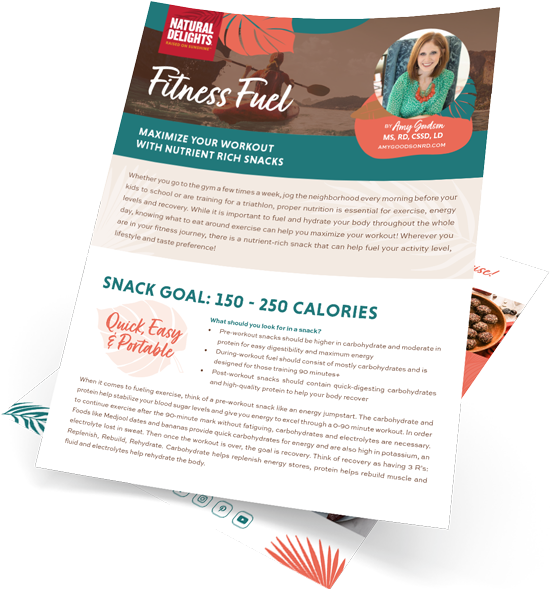All statements on this page have been written and peer reviewed by registered dietitians. All statements are made by that of the author as an expert in health sciences and not by Natural Delights as a company.
Whether you go to the gym a few times a week, jog the neighborhood every morning or are training for a triathlon, proper nutrition can support performance, energy levels and recovery. While it is important to fuel and hydrate your body throughout the whole day, knowing what to eat and when to eat around exercise may support the energy needed to train and perform.
Medjool dates are an excellent source of carbohydrate pre-, during- and post- workout. They may support fueling your exercise routine and may provide your body with other nutrients like antioxidants and potassium that help your body recover. Plus, they are a simple, convenient, ready-to-eat snack that you can throw in your gym bag.
Pre-workout nutrition is focused on fueling and hydrating the body for training and performance.
Consume a pre-workout meal to provide your body with energy for training.
Oatmeal with Medjool dates and nuts paired with low-fat Greek yogurt and 16 - 20 ounces of water
Turkey and cheese sandwich on whole grain bread with avocado, lettuce and tomato paired with 2-3 Medjool dates and 16 - 20 ounces of water
Cashew Chicken Stir Fry on brown rice or quinoa and 16 - 20 ounces of water
Rich in complex carbohydrates (think oatmeal, quinoa or brown rice)
Lower in fat (think nuts and oils) and fiber (think broccoli and cauliflower)
Moderate in lean protein (think eggs, chicken or dairy)
Consume plenty of fluids pre-workout, at least 16-20 ounces (think water and sports drinks)
If you feel hungry, add a snack of carbohydrates with a small amount of protein (this snack is not necessary if you consumed a meal close to the workout).
2 Medjool dates with nut butter and 5-10 ounces of water
Whole grain granola bar with a string cheese and 5-10 ounces of water
Energy bar with 5-10 grams of protein and 5-10 ounces of water
It is important to consume a carbohydrate-rich snack prior to exercise to provide the body with energy
Because you have not consumed fluid all night, try to drink 16-20 ounces of water before starting exercise
During exercise, the main focus is to stay hydrated.
For those that train longer than 90 minutes, the sports nutrition recommendation is to add 30-60 grams of carbohydrate per hour.

Post-workout nutrition is focused on recovery. Think of recovery as having 3 R's: Replenish, Rebuild and Rehydrate.
Low-fat chocolate milk
Vanilla Greek yogurt with chopped Medjool dates and water
Protein bar and water
Smoothie made with low-fat milk, whey protein, Medjool dates and banana
2-3 ounces beef or chicken jerky, 2-4 Medjool dates and water
Follow your post-workout snack with another snack or meal within the 1 - 2 hours. This meal should contain complex carbohydrates, lean protein, healthy fat, veggies (if appropriate) and fluid.
Steel Oats with Medjool Dates and Wild Huckleberries and 2 scrambled eggs with water
Harvest Quinoa Salad with salmon or chicken with water
Beef and Date Empanadas and a fresh green salad with water
Regulating body temperature
Helps lubricate and cushion joints
Helps rid the body of wastes through urination, perspiration and bowel movements

In fact, depending on age, the human body is comprised of 60-80% water, making it essential that you're hydrating continuously.
Electrolytes are an essential part of hydration, specifically sodium and potassium. The average person loses three times the amount of sodium in sweat as potassium, and salty sweaters can lose even more.

These statements have not been evaluated by the Food and Drug Administration. This product is not intended to diagnose, treat, cure or prevent any disease.